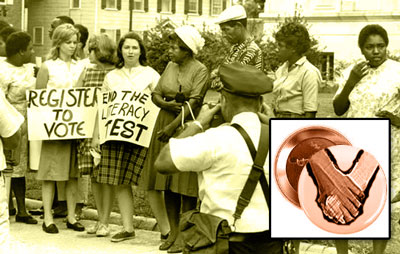Page 1 Page 2 Page 3 Page 4 Page 5

We headed toward another lunch counter across the street. There we were told, “Sure, what’ll you have?” and given menus. Surprised, we each ordered small items. We were served promptly and courteously. That ended our sit-ins. None of us had any money left to try that again.
Most of what we did in ’65 was the same as the summer before — civil rights meetings in the churches and getting people to try to register to vote. I started a class preparing people to fill out the four-page registration form. Using some discarded civics textbooks from Michigan, I expanded the scope of the class. The first chapter described the difference between a democracy and a dictatorship. At the end of the chapter the students were asked if they were living in a democracy or a dictatorship. To my surprise, the class unanimously agreed they were in a dictatorship. I shouldn’t have been surprised. None of them had ever voted, and they had no say in how the government treated them.
One elderly black told me he had regularly gone to register to vote for thirty years. He did succeed in registering once, only to be turned away when he went to vote. His name had been removed from the list. Why continue to beat your head against a brick wall? As long as the wall was still there he was determined to make a statement. Even that got him in trouble. The Klan tried to burn a cross at his house, but he drove them away with his rifle. He was one of the first to register under the new Voting Rights Act of 1965.
And sit-ins? “Not worth the trouble. Once you got the vote you don’t need no sit-ins.”
We’ll walk hand in hand
We’ll walk hand in hand
We’ll walk hand in hand someday
Oh, deep in my heart I do believe
We’ll walk hand in hand some day
I once met a black man who told me he had lived in Bakersfield, California for a while before moving back to Mississippi. “What on earth for?” I asked. “Because here I knew where I stood,” was the reply. Knowing the situation, no matter how bad, was seen as better than never knowing what you were up against. The polls at the time said one person in three in California was just as racist as those in Mississippi. But how do you tell which one? And what were the other two thinking?
In February three Mayersville students were suspended from school for wearing a civil rights button depicting black and white hands clasped together in friendship. The black community saw this as a challenge. Suddenly everyone wanted a button. Only one hundred were available on short notice, but by passing them around, three hundred students were expelled over the course of three days.
The superintendent of schools met with the parents and offered to take the students back with a simple apology. The parents didn’t think they had anything to apologize for. They tried to use this as an opportunity to vent all of their complaints about a school system that wouldn’t listen to them. The all-white school board had a standing policy not to allow blacks to appear before them, and the superintendent only talked to them about disciplinary issues. The meeting went nowhere and left three hundred students without a school. Mississippi had dropped its compulsory attendance law several years earlier in an attempt to get around desegregation, so the school district had no leverage left.
I wasn’t there at the confrontation, but I heard plenty from the angry parents afterward. They decided to start their own Freedom Schools. The schools were set up in black churches in three locations: two in Issaquena County and one in neighboring Sharkey County. I was asked to direct the one ten miles from Mayersville, and moved in with a family close to the school.
At first I was concerned that the kids would be better-off in the public schools, but once I started working with them I found the segregated public schools hadn’t taught them much. White Mississippi didn’t want uppity blacks. They didn’t provide any textbooks and hired poorly educated teachers. Some of the black schoolteachers I met were themselves unable to read or write.
I was already familiar with lesson plans, but starting a whole curriculum from scratch was new to me. I obtained some used textbooks and concentrated on teaching reading and math to the high schoolers, then had them teach what they were learning to the younger kids. The parents at the other Freedom Schools were more imaginative. They had their kids write and perform plays about civil rights.
I thought Mayersville was small, but the school I was teaching at was in an even smaller rural enclave of black farmers. Some of the students came from a nearby plantation. After I was chased at ninety miles an hour by the angry plantation owner, I learned to get around on foot by following old Indian trails through the woods. My Boy Scout training was put to good use.
In May the schools were getting ready to close for the summer. I accepted a position as an agricultural volunteer with International Voluntary Services and was off to Vietnam. Out of the frying pan into the fire. I didn’t know it at the time, but President Johnson had just sent the first combat soldiers to Vietnam. But after Mississippi, living in a war zone was a vacation.


Excellent site. Lots of helpful details in this article. My business is sending it to some friends ans additionally revealing around delectable. Of course, thanks for your sebaceous!